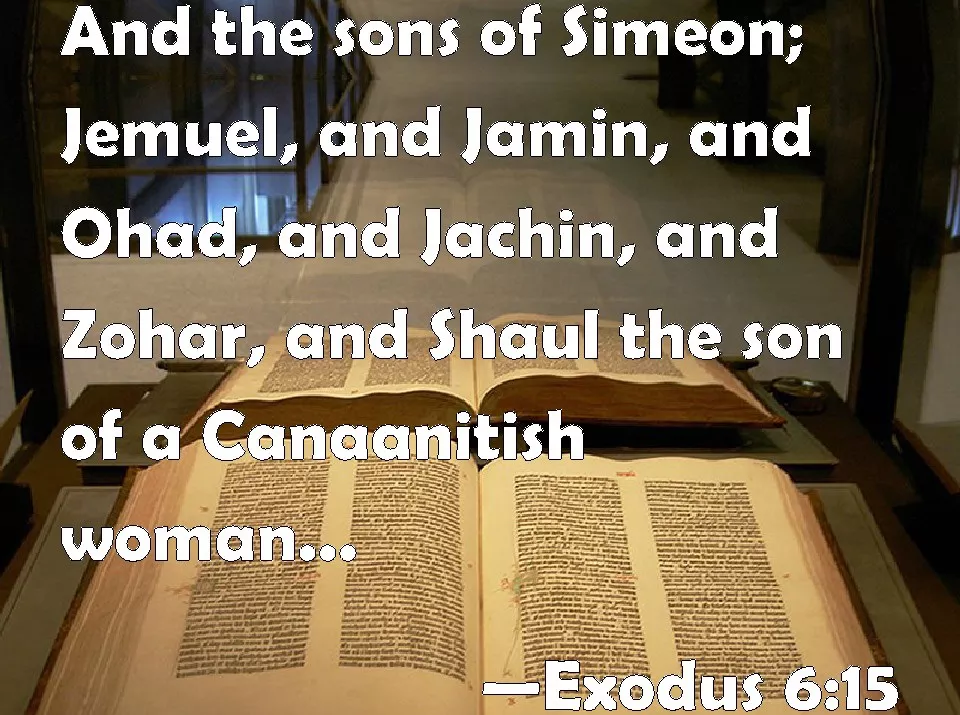Read the Daily Bible Verse – Exodus 6:15 To Strengthen Your Spiritual Journey.
Exodus 6:15 is a verse often overlooked due to its position in a genealogical list, yet it carries significant theological and historical insights. This article explores the meaning and implications of the verse, structured under various headings to provide a comprehensive understanding.
Exodus 6:15 states:
“And the sons of Simeon; Jemuel, and Jamin, and Ohad, and Jachin, and Zohar, and Shaul the son of a Canaanitish woman: these are the families of Simeon” (KJV).
This verse appears in a genealogy outlining the descendants of Israel’s sons, focusing on the family of Simeon. While it may seem to be a simple record, it serves as a key piece in understanding God’s redemptive work through Israel’s history.
The Context on Exodus 6:15 KJV
Exodus 6 is set during Israel’s captivity in Egypt, a period marked by God’s revelation to Moses about His plan to deliver the Israelites. The chapter begins with God reaffirming His covenant with Abraham, Isaac, and Jacob, emphasizing His promise to free their descendants and bring them to the Promised Land.
The genealogy in verses 14–27, including Exodus 6:15, serves multiple purposes:
To establish Moses and Aaron’s lineage – It underscores their rightful position as leaders chosen by God.
To connect the Israelites to God’s covenant – By listing their tribal families, it reaffirms their identity as God’s chosen people.
To emphasize God’s providence – The genealogy highlights the continuity of God’s plan from the patriarchs to the current generation.
The mention of Simeon’s descendants, particularly Shaul, “the son of a Canaanitish woman,” provides a glimpse into the historical and cultural dynamics of the time.
The Exodus 6:15 Meaning
The Sons of Simeon
Simeon, the second son of Jacob and Leah, played a complex role in Israel’s history. His descendants are listed here to emphasize the familial structure of Israel and their connection to the patriarchs. Each name represents a family or clan within the tribe of Simeon.
Jemuel, Jamin, Ohad, Jachin, and Zohar: These sons form the core of Simeon’s lineage, signifying the foundation of the tribe.
Shaul, the son of a Canaanitish woman: This detail is notable because it reflects intermarriage with non-Israelites, a practice generally discouraged but not uncommon during this period.
Cultural and Theological Implications
The inclusion of Shaul highlights God’s inclusivity in His plan for Israel. Despite being born to a Canaanitish woman, Shaul is listed as part of the tribe, demonstrating that God’s covenant extended beyond human boundaries of lineage and purity.
This verse also serves to remind readers of God’s ability to work through flawed and diverse circumstances to fulfill His purposes.
Exodus 6:15 Application in Life
Exodus 6:15 teaches several practical lessons:
God’s Sovereignty Over History
The genealogy demonstrates that God’s purposes prevail through generations, even amid human shortcomings. This is a reminder to trust in God’s overarching plan for our lives.
Inclusivity in God’s Plan
The mention of Shaul challenges believers to reflect on the inclusivity of God’s covenant. It encourages us to embrace others, regardless of their background, as part of God’s redemptive story.
Faithfulness in Small Details
Though genealogies may seem mundane, they hold significant truths about God’s faithfulness. This reminds us that God is present in both grand and minor aspects of our lives.
See Also: What Does Exodus 6:14 Mean?
Comparison with Other Biblical Texts
Other Genealogies in Scripture
Exodus 6:15 parallels other genealogical records in the Bible, such as those in Genesis 49, Numbers 26, and 1 Chronicles 4. These genealogies serve to trace God’s covenantal promises and highlight His faithfulness.
For example:
Genesis 49:5–7: Simeon and Levi’s violent actions against Shechem resulted in a prophecy of dispersion for their descendants. Exodus 6:15 reflects the ongoing story of this tribe’s role in Israel.
Numbers 26:12–14: The descendants of Simeon are further detailed, showing the fulfillment of God’s promises to multiply the Israelites.
The Inclusion of Non-Israelites
The mention of Shaul, the son of a Canaanitish woman, resonates with stories like Rahab and Ruth, non-Israelites who became integral to God’s redemptive plan. This reinforces the theme of God’s grace transcending ethnic and cultural boundaries.
Modern-Day Relevance
Exodus 6:15 remains relevant today in several ways:
Recognizing God’s Faithfulness
Just as God preserved Israel through generations, He remains faithful to His promises to us. We can trust Him to guide our lives according to His purpose.
Embracing Diversity
The inclusion of Shaul reminds us to celebrate diversity within the body of Christ. God’s kingdom is open to all who believe, regardless of their background.
Valuing Our Spiritual Heritage
Genealogies like this one encourage us to reflect on our spiritual heritage and the legacy we leave for future generations.
Finding Meaning in the Details
Even seemingly minor verses carry profound truths. This challenges us to approach Scripture with a mindset of discovery, seeking to uncover God’s message in every passage.
Conclusion
Exodus 6:15, though part of a larger genealogical list, offers rich insights into God’s faithfulness, inclusivity, and redemptive plan. By tracing the descendants of Simeon, it underscores the continuity of God’s covenant with Israel and His ability to work through diverse circumstances.
For modern readers, this verse serves as a reminder to trust in God’s providence, embrace diversity within His kingdom, and cherish the spiritual heritage passed down to us.
Exodus 6:15 Commentary
Exodus 6:15 is a testament to the depth of Scripture, where even genealogies carry profound meaning. The inclusion of Shaul reflects God’s grace and inclusivity, challenging readers to embrace others as part of His redemptive story.
The verse also highlights the importance of family and lineage in Israel’s history, connecting the present generation to the patriarchal promises. For Christians, this serves as a reminder of our identity as part of God’s spiritual family, rooted in His covenantal faithfulness.
As we reflect on Exodus 6:15, we are called to celebrate God’s sovereignty, recognize the value of every individual in His plan, and find encouragement in His enduring promises.
Related topics:


